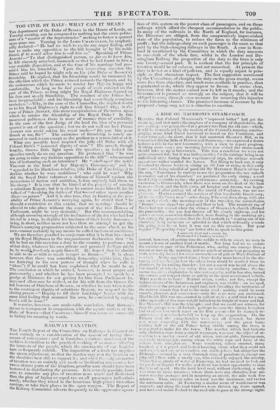11 A 1LW Al".f AX AT IO N. Tim Fourth
Report of the Committee on sis directed al-
most entirely to a consideration of the sysiem of taxing those means or conveyance : and it furnishes a (-unions specimen of the reckless inattention to the practical working et' eleasies,e the interests of the people, which the enactments or Leg;A:i- tune so frequently exhibit. The imposition of a flesh tax reydres the nicest,adjustment, so that the burden may rest the heaviest on the shoulders best able to support it ; and whmi the seh'eet-matte' of taxation was an entirely new mode of fiteilitating intercourse be- tween distant parts of' the kingdom, peculiar care should have been bestowed in distributing the pressure. It is scarcely possible, how- ever, to conceive any plan of taxation more crude and ill-devised than the plan of laying an equal tax on all passengers indiscrimi- nately, whether they travel in the luxurious high-priced first-class carnage, or take their places in the open waggon. The Report of the Railway Committee adverts frequently to the oppressive opera- tion of this system on the poorer class of passengers, and on those railways which afford the cheapest accommodation to the public. In many of' the railroads in the North of England, for instance, the Directors are obliged, from the comparatively impoverished state of the population, to reduce the fares to the minimum of profit ; but the mileage-duty on each passenger is the same as that paid by the high-charging railways in the South. A case in Scot- land is mentioned by the Committee in which the duty amounts to one-sixth of the whole fare, whilst in the London and Bir- mingham Railway the proportion of the duty to the fares is only one twenty-second part. It is evident that the fair principle of taxation would be w/ etdorent, and not numerical. At present the duty is levied as a kind of poll-tax, and is equally unjust in prin- ciple as that obnoxious impost. The first suggestion mentioned by the Committee, of charging the duty on the gross receipt, seems more free from objection, and much more available in practice, than a graduated scale, which they appear to favour. It seems clear, however, that the matter cannot now be left as it stands; and the Government is pressed so strongly on the subject, that it will be obliged to carry through some measure for removing this injustice to the labouring classes. The promised increase of revenue by the proposed change may act as a stimulus to exertion.


























 Previous page
Previous page